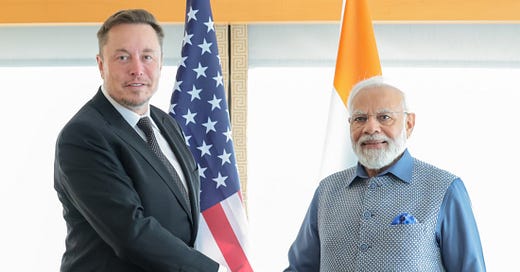Modi-Musk Handshake Set to Drive Transformative Engagement
Elon Musk's Proposed Investments in India: Starlink and Tesla; Chandrababu Naidu may serve as a catalyst.
Elon Musk Congratulates PM Modi on 2024 Election Victory
Elon Musk, CEO of Tesla and SpaceX, took to social media platform X (formerly Twitter) to congratulate Prime Minister Narendra Modi on his recent victory in the 2024 Lok Sabha elections. Musk tweeted, "Congratulations @narendramodi on your victory in the world's largest democratic elections! Looking forward to my companies doing exciting work in India."
This tweet reflects Musk's continued interest in the Indian market, particularly with his companies Tesla and Starlink. However, this enthusiasm comes after a postponed visit to India that was initially scheduled just before the elections. Musk had then expressed his regret in a tweet, saying, "Due to unforeseen circumstances, my visit to India has been postponed. I look forward to rescheduling and discussing exciting opportunities with @narendramodi."
The Musk-Modi Meeting in the USA
The personal relationship between Elon Musk and PM Modi has been strengthening over the years. Their significant meeting in June 2022 in the USA laid a solid foundation for future collaborations. During this meeting, Musk discussed Tesla's ambitions for the Indian market and expressed confidence in India's potential as a key market for electric vehicles (EVs). Modi, known for his pro-business stance, assured Musk of a favourable environment for foreign investments, particularly in high-tech sectors like EVs and space technology. However, Musk has repeatedly stated that he, in principle, would not like to manufacture Tesla cars in a country that does not yet allow his vehicles to be driven on its roads. Although officials have indicated a willingness to consider suitable amendments to the Motor Vehicles Act, 1988, the absence of enabling provisions currently may also be a dampener, although Tesla has not publicly articulated this concern regarding India.
Challenges Facing Starlink's Investment in India
Elon Musk's Starlink satellite internet service has faced several key issues that have delayed its launch in India. In 2021, the Indian government ordered Starlink to stop preselling its services until it obtained the necessary licenses to operate. Delays in licensing have been partly due to the government's requirement for complete disclosure of ownership details, which Starlink has struggled with due to US privacy laws restricting the sharing of information about its parent company, SpaceX. Additionally, concerns over foreign ownership and investment have prompted consultations between the Department of Telecommunications (DoT) and the Department for Promotion of Industry & Internal Trade (DPIIT). This scrutiny echoes issues faced by Verizon in the past, leading to amendments in India's Foreign Direct Investment (FDI) policy in 2020 to address shareholder concerns from countries sharing land borders with India, such as Pakistan and Bangladesh.
Other significant hurdles include India's high import duties on certain products, which Musk has lamented are among the "highest in the world." The Indian government insists on local manufacturing before granting any tax concessions, a requirement that could also apply to Starlink's equipment. Furthermore, potential security concerns and content regulation issues, particularly given the numerous content takedown orders imposed on social media platforms like X (formerly Twitter), which Musk now owns, could complicate Starlink's operations. Despite these challenges, recent developments suggest that Starlink may be close to receiving initial approvals, as the government has eased some regulations to attract more foreign investment. Nonetheless, overcoming the remaining regulatory hurdles, addressing security concerns, and meeting local manufacturing requirements will take time before Starlink can fully launch its services in India.
Some observers have speculated that the entry of Starlink could provide direct competition to the current dominant player, Jio—owned by the Mukesh Ambani-led Reliance Group—which might explain the Modi 2.0 administration's slow-paced approach to the Starlink proposal. However, there is no direct evidence to support this speculation.
Starlink's Potential to Transform Internet Access in Challenging Terrains
Starlink's satellite internet service operates by leveraging a large constellation of low Earth orbit satellites positioned at around 550 km, significantly lower than traditional geostationary satellites. This lower altitude enables Starlink to offer lower latency and higher speeds, crucial for modern internet usage. The user terminal, a dish on the ground, communicates with the satellites overhead, frequently connecting to new satellites to maintain a continuous signal. These satellites relay data to ground stations connected to the internet backbone, ensuring a robust and efficient data transmission process.
Using multiple frequency bands, primarily in the Ku, Ka, and V ranges, Starlink can handle diverse data transmission tasks, making it versatile for various applications. This advanced technology is particularly beneficial for countries like India, with its challenging geographical and topographical diversity, including high altitudes, dense jungles, flood-prone areas, and remote tribal regions. Traditional optical fibre networks are often impractical or prohibitively expensive to install and maintain in these areas. Starlink's satellite-based approach can provide high-speed, reliable internet access to these underserved regions, bridging the digital divide and fostering economic and social development.
Issues with Tesla's Investment and Manufacturing in India
Elon Musk has shown strong interest in investing in India through Tesla, though no major investments have been finalized yet. Musk has expressed excitement about India's potential, calling it a country with "more promise than any large country in the world." Tesla has been actively scouting for factory locations and showroom spaces in India. Musk was expected to announce a $2-3 billion investment in India, primarily for building a new Tesla factory, during a planned visit to meet PM Modi, before the Lok Sabha elections. However, this visit was postponed, delaying the anticipated announcement.
One of the significant hurdles Tesla has faced is India's steep import taxes on electric vehicles, which Musk has lamented are among the "highest in the world." This has been a substantial barrier to Tesla's entry into the Indian market. However, recent developments suggest a shift in the landscape. In March 2024, India unveiled a new EV policy lowering import taxes to 15% if carmakers invest at least $500 million and start local production within three years. This policy could facilitate Tesla's market entry and potentially lead to significant investments. While regulatory hurdles and local manufacturing requirements have delayed concrete investment plans so far, the new EV policy and Musk's impending visit suggest that significant breakthroughs and announcements may soon be on the horizon, offering a major boost to India's EV ambitions.
Optimism for the Future: Modi 3.0 and Business-Friendly Environment
Despite these challenges, the future looks promising. With PM Modi securing a third term and leaders like Chandrababu Naidu playing a crucial role in fostering a business-friendly environment, the path seems smoother for Musk's ventures. India is not the first country to face these hurdles; both Starlink and Tesla have successfully navigated similar challenges in multiple countries.
Starlink is already operational in over 70 countries, providing high-speed internet in remote and underserved areas. Tesla, too, has established a strong presence in many global markets, overcoming regulatory and logistical obstacles. The optimism around Modi's third term, coupled with pro-business reforms and India's strategic interest in technology and innovation, bodes well for the successful implementation of Starlink and Tesla in the near future.
Summing Up and Looking Forward
Elon Musk's ambitious plans for Starlink and Tesla in India highlight significant opportunities and challenges. The positive relationship between Musk and PM Modi, alongside recent policy changes, suggests that these hurdles may soon be overcome. With the Modi 3.0 Government actively working to attract high-tech investments and create a favourable business environment, the future looks bright for Musk's ventures in India. The successful entry of Starlink and Tesla into the Indian market would mark a significant milestone in the country's journey towards technological advancement and sustainable development.
Expect quick decisions, and we at "The KBS Chronicle, promise to keep you updated well ahead of traditional media.
If you believe this article would interest someone you know, please feel free to share it anonymously (for us), using any medium you prefer. Thank you for considering it!





